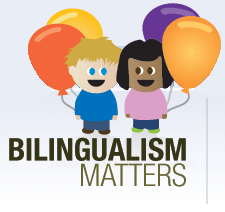 It
is a great pleasure for us to welcome you to the website of “With two languages”!
It concerns a “branch” – partner organisation of the information service of
Bilingualism Matters at the University of Edinburgh. The founder and general
director of the service is Professor Antonella Sorace, who is internationally
recognised as one of the world’s most renowned researchers on Bilingualism. In
Greece, the director of the service “With two languages” is Professor Ianthi-Maria
Tsimpli who is a distinguished researcher in language acquisition issues.
It
is a great pleasure for us to welcome you to the website of “With two languages”!
It concerns a “branch” – partner organisation of the information service of
Bilingualism Matters at the University of Edinburgh. The founder and general
director of the service is Professor Antonella Sorace, who is internationally
recognised as one of the world’s most renowned researchers on Bilingualism. In
Greece, the director of the service “With two languages” is Professor Ianthi-Maria
Tsimpli who is a distinguished researcher in language acquisition issues.
Although it is very common for a child to speak more than one languages abroad, in Greece it is only recently that we’ve experienced bilingualism and multilingualism. In Greece, Âilingualism has mainly two origins: (a) children of mixed marriages, families in which one of the parents speaks a language other than Greek and (b) children in immigrant families. A third (numerically smaller) possibility is the children of Greek parents who, by knowing the benefits of Bilingualism, send their kids to a bilingual or foreign-language school (e.g. French, English, German etc. school)
According to recently recorded data, the rate of bilingual children in Greece exceeds 10% of the overall student population. Nearly in every school classroom, there are 1-4 bilingual children that speak mainly Albanian, Russian, Turkish, Romani as their first language/mother tongue. The total number of bilingual children in 2002-03 was estimated to be 96.526 (2004: 58), while the first language that these children speak at home covers a very wide range (as also shown in the graph with the countries of origin of these families) (2004: 29).
The relatively new phenomenon of Bilingualism and the lack of knowledge about it often lead to prejudices and negative reactions regarding raising a child with two languages. Unfortunately, bilingualism has often been considered a state that confuses the child, a state ‘different’ from normal. The goal of the service “With two languages” is to help everyone by providing them with a wealth of information regarding the advantages of bilingualism and to encourage the families, the teachers and institutions to support the bilingual and even multilingual development of our children.
Research has shown that bilingualism is advantageous for the development of children. Children who are exposed to different languages can easily perceive and understand different cultures and people. In this way, they familiriase themselves with different ways of thinking and understand more easily the opinion of ‘others’. Also, it has been scientifically proven that bilingual children tend to perform better on ‘multiple-task’ tests and have better attention. They are often better at reading and they generally learn foreign languages more easily. Therefore Bilingualism is not just “Two Languages”, but much more!
However, bilingualism’s benefits are in risk of being turned into disadvantages when the Greek school doesn’t manage to deal with heterogeneity in the classroom. All together, we are trying to achieve a change in the current conditions, through programs such as Foreigner and Repatriated Students’ Education, Education of the Muslim Minority Children in Thrace, Education of Romani children and the program ‘Greek Education Abroad’ among others. Besides, there are state-sponsored bodies (such as the Greek Language Center and the Institute of Speech Processing) as well as non-profit organisations, such as “Polydromo: Group for Bilingualism and Multiculturalism in Education and Society” that systematically work for the investigation of the needs in the domain of language and the spread of scientific knowledge in the field.
Read more (articles from scientific journals and press release abroad regarding the benefits of bilingualism) here.